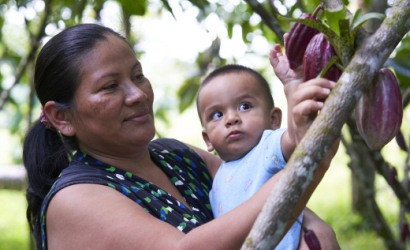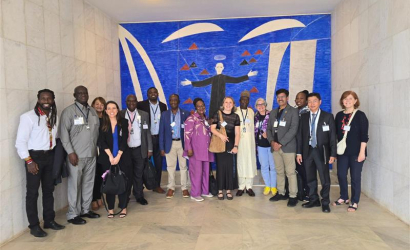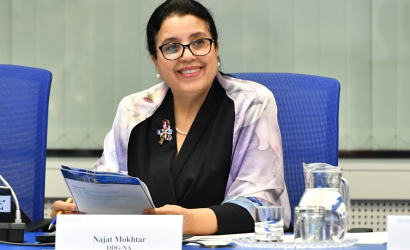The 53rd Plenary Session of the Committee on World Food Security (CFS53) marked a pivotal moment for global nutrition and food systems transformation.
For UN-Nutrition and partners, it was an opportunity to amplify UN-Nutrition and member agencies’ collective voice, showcase country-led solutions and innovations, and reinforce the central role of nutrition and healthy diets in achieving sustainable, equitable, and climate-resilient food systems.
During CFS53 week, the UN-Nutrition Secretariat and its Member Agencies seized the chance to reconnect with long-standing partners, forge new collaborations, and exchange ideas on today’s most pressing nutrition challenges — all amidst a dynamic mix of Plenary sessions and side events.
UN-Nutrition side-events: Key learnings and outcomes
During CFS53, UN-Nutrition and partners held a series of side events exploring innovative financing strategies to foster healthy diets, climate action, and nutrition; examined rural, peri-urban, and urban food systems solutions for more resilient food systems; and looked at addressing power asymmetries to foster a just transition for nutrition, climate, and livelihoods.
Financing a sustainable future – Making responsible investments

On Tuesday, 21 October, the Financing a Sustainable Future event, co organized by partners including the HDSFS Coalition, IFAD, and I-CAN, brought together experts from Brazil, Egypt, Sierra Leone, Denmark, and Uganda to explore how responsible financing can accelerate the transformation of food systems for nutrition, equity, and climate resilience. They looked at solutions to unlock financing mechanisms for just agrifood system transitions and shared real-world innovative examples supporting small-scale farmers.
Panelists underscored the urgent need for coherent policies, public–private alignment, and investment models that put small-scale and family farmers – who produce much of the world’s food – at the centre of the transition.
Natasha Hayward from GAFSP – World Bank Group emphasized that inclusive financing mechanisms can bridge humanitarian and development divides, empowering smallholders and local food actors to drive resilient, nutrition-sensitive food systems.
Brazil’s Fernanda Machiaveli, Vice Minister of the Ministry for Agrarian Development, outlined how the government is mobilizing climate and rural finance through initiatives such as targeted rural credit, school feeding programmes sourcing from family farms, and payments for ecosystem services that protect the Amazon while generating local income.
Egypt’s Minister Assistant Hossam Abd el-Ghaffar shared how the country’s integrated agrifood and climate strategy is channeling national and international finance to support climate-resilient, nutrition-sensitive agriculture., with measurable gains in dietary diversity, particularly among women.
Sierra Leone’s Nenebah Jalloh, HDSFS Coalition Focal Point and SUN National Coordinator, highlighted national efforts to embed nutrition into agricultural financing frameworks and promote equity through women’s and youth access to credit – bringing together the agriculture, climate, and finance sectors to ensure every dollar contributes to both climate and nutrition outcomes.

Mary Bekunda from DanChurchAid Uganda shared practical blended finance models linking impact investors with smallholders. Initiatives include offering affordable credit and incentives for land restoration and ecosystem services, demonstrating scalable ways to support climate-positive and nutrition-sensitive agriculture.
H.E. Peter Taksøe-Jensen, Ambassador of Denmark to Italy, Malta and San Marino highlighted mobilizing responsible and sustainable finance is key to ensuring that food systems transformation delivers equitable nutrition outcomes and benefits small-scale producers, particularly women and youth. Wrapping up the discussion, Rick van der Kamp, IFAD’s Lead Global Technical Specialist, emphasized:
“We must invest with intentionality – aligning policies, finance, and partnerships so that every dollar works for healthy diets, climate resilience, and equity. Progress happens when governments, civil society, and the private sector come together. Transformation is not theoretical – it’s already happening; now we must scale it up and sustain it.”
Watch the full session. See more on X.
Local food solutions for healthy diets – Strengthening urban and peri-urban agri-food systems
On Wednesday, 22 October, UN-Nutrition’s session, organized jointly with the HDSFS Coalition, WFP, FAO, IFAD, the Government of Brazil, Instituto Comida do Amanhã, and others, highlighted how locally driven food solutions can improve access to healthy diets, particularly in fragile urban and peri-urban contexts. Discussions focused on innovative approaches, food policies, and multi-stakeholder governance that strengthen resilience, nutrition, and environmental sustainability.
Nancy Aburto, Deputy Director, Food and Nutrition Division, FAO, opened the event by presenting a joint initiative by FAO, IFAD and WFP on Local Food Solutions to promote healthy diets, especially in fragile and crisis-affected settings, recognizing, prioritizing, and valuing the potential of local opportunities. This collaboration embodies how the UN system can work as one to turn global commitments into local impact.

A panel of experts showcased locally driven initiatives demonstrating how communities are turning policy into practice to achieve healthy diets and resilient food systems.
Brazil highlighted its national agriculture policy, linking community gardens, green cities, and social inclusion to build resilience and solidarity.
Nigeria demonstrated how multisectoral coordination is scaling community food initiatives into national nutrition strategies.
Bangladesh presented locally produced fortified rice kernels improving access to nutritious staples for millions, while Argentina shared how urban agroecology in Rosario advances sustainable production, connects local markets with health systems, and informs public food policies.
Haiti illustrated how locally sourced school meals and nutritious foods support child and maternal nutrition while generating local livelihoods.

As Dr. Nancy Aburto, FAO Deputy Director for Nutrition, emphasized: “Local food solutions can achieve sustainable healthy diets and thriving communities everywhere.”
Key lessons learned included:
- The importance of multi-stakeholder partnerships;
- The integration of local knowledge into policy frameworks;
- And the potential for short supply chains to simultaneously enhance nutrition, resilience, and environmental sustainability.
These examples underscore that locally led solutions are not only practical but also scalable pathways to healthier, more equitable, and climate-resilient food systems.
Watch the full session. See more on X.
Meaningful multi-stakeholder collaboration – Tackling power asymmetries to improve nutrition

On Friday, 24 October, UN-Nutrition, jointly with UNDP and WHO, hosted a thought-provoking side event on addressing power asymmetries to transform food system and improve nutrition. The session brought together governments, civil society, Indigenous Peoples’ organizations, academia, and philanthropy to explore how power relations influence food systems governance and how these dynamics can be rebalanced to achieve equitable, inclusive, and sustainable outcomes for nutrition.
UN Special Rapporteur on the Right to Food Michael Fakhri reminded the audience that “power in food systems is not discussed enough,” calling attention to how corporate concentration perpetuates relationships of dependency and exploitation. “What we want,” he said, “are relations based on reciprocity and care — how we treat the land and how we treat people are one and the same.”
Brazil’s Janine Coutinho of the Ministry of Social Development highlighted how the country is tackling corporate influence and promoting evidence-based policies to protect children from ultra-processed foods. Brazil’s recent decree on food in schools integrates nutrition education, prioritizes fresh foods, and regulates food marketing to children – mobilizing civil society and subnational governments and already safeguarding 21 million students.

Madeleine Kaufmann, from the Swiss Federal Office for Agriculture, presented Switzerland’s citizens’ assembly on the future of food, a participatory process that gathered public perspectives to inform the country’s agriculture and food systems policy beyond 2030. The approach, she noted, reflects “a more inclusive democracy” where multi-stakeholder collaboration is at the core of policy design.
From Ghana, Professor Amos Laar underscored the importance of addressing conflicts of interest in food systems governance. Inclusivity and transparency in policymaking are essential to protect public health and rebalance industry influence, ensuring food systems serve people’s needs first.
Dionicio Canahui, from the International Indian Treaty Council, called for confronting structural racism and colonialism that continue to marginalize Indigenous food systems. “We must dismantle power and put people – not profit – at the center.”

The discussion also highlighted how philanthropy, as Ruchi Tripathi from the Global Alliance for the Future of Food noted, holds “both visible and invisible forms of power” that must be intentionally leveraged to build collective, bottom-up power and support agroecological transitions.
Closing the event, Anna Horner, Senior Coordinator of UN-Nutrition, reflected:
“The collective power of 15 UN agencies and entities working together is transformative. Coordination and collaboration are our strongest tools to tackle inequities and drive change.”
The session underscored that transforming food systems is ultimately about transforming relationships of power – through collaboration, accountability, and shared commitment to the right to food and equitable nutrition for all.
Watch the full session. See more on X.
UN-Nutrition’s contribution to CFS53 plenary sessions
UN-Nutrition’s engagement at CFS53 also included contributions to the plenary sessions. Under agenda item VI, UN-Nutrition highlighted the value of CFS Voluntary Guidelines on Food Systems and Nutrition as practical tools to turn policy into practice and guide whole-of-government, civil society, and private sector action. This was demonstrated by UN-Nutrition’s successful in-country dissemination, working closely with the UN Resident Coordinator and Country Teams to foster multisectoral, integrated approaches to nutrition. Read the full statement.
During session IX, under the theme Fostering Momentum and Commitment for Nutrition: Accelerating Action Towards 2030 and Beyond, UN-Nutrition emphasized the importance of embedding nutrition into broader sectoral policies, programmes, and investments – including through the Global Compact for Nutrition Integration – to mainstream nutrition across the SDGs, reduce fragmentation, and strengthen cross-sectoral collaboration. Read the full statement.
These statements reinforced UN-Nutrition’s commitment to translating global commitments and CFS policy guidance into actionable, country-level results, ensuring nutrition remains central to equitable, sustainable, and resilient food systems. See more on X.
WATCH THE EVENTS:
- Plenary session "Fostering Momentum and Commitment for Nutrition: Accelerating Action Towards 2030 and Beyond."
- Financing a sustainable future: Making responsible investments for healthy diets, climate action, and equity in food systems
- Local Food Solutions for Healthy Diets: Strengthening Urban and Peri-Urban Agri-food Systems
- Meaningful multi-stakeholder collaboration: Why addressing power asymmetries is essential for food system transformation and improved nutrition



